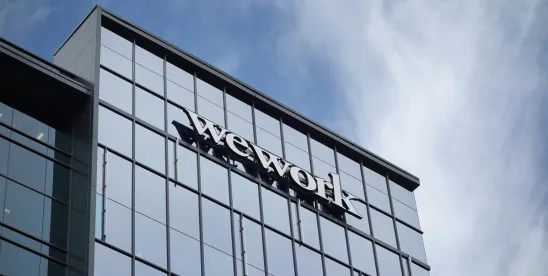In In re WeWork Litigation, C.A. No. 2020-0258-AGB (Del. Ch. Aug. 21, 2020), a special committee of the board of directors of The We Company (the “Company”) sought to obtain certain privileged communication among management of the Company and its counsel in discovery arising from breach of contract and breach of fiduciary duty case. The Court held that management of a Delaware corporation (“Management”) does not have the authority to unilaterally preclude a director of the corporation from obtaining the corporation’s privileged information, an issue of first impression in the State of Delaware.
In October 2019, Softbank Group Corp. and SoftBank Vision Fund (AIV M1) L.P. (together, “SoftBank”) proposed a number of transactions to ease the Company’s liquidity crisis. The board of directors (the “Board”) of the Company established a special committee of two disinterested directors (the “Special Committee”) that negotiated and consummated the Master Transaction Agreement (the “MTA”) with Softbank in order to address a liquidity crisis at the Company. The MTA (A) gave SoftBank (i) majority voting and economic control of the Company and (ii) the right to designate five of the Company’s ten directors (one of which would be designated chairman) and (B) required the Company’s founder Adam Neumann to execute a proxy giving voting control of his super-voting founder shares to the Board. In addition, the MTA contemplated a $3 billion tender offer for stock of the Company by SoftBank, subject to certain closing conditions (the “Tender Offer”). Rather than complete the Tender Offer, SoftBank terminated it on April 1, 2020 asserting that certain closing conditions had not been satisfied. Six days later, the Special Committee filed suit on behalf of the Company against SoftBank (the “Litigation”) asserting breach of contract under the MTA and breach of fiduciary duty as the controlling stockholders for advancing their own interests and using its control and influence to narrow the Company’s options and harm the minority shareholders.
SoftBank moved to dismiss the Litigation on April 17, 2020, contending that the Special Committee was conflicted because of the directors’ personal interest in selling shares in the Tender Offer. SoftBank also sent a letter to the Board asserting that the Special Committee was not authorized to act on behalf of the Company in the Litigation. The Special Committee responded with a letter of its own to the Board, asserting that it permissible for it to bring the Litigation and that it was not conflicted and if it was so was the every other director on the Board. It also contended that the Special Committee had sufficient authority under the MTA and related Board resolutions to continue the Litigation. In response, on April 29, 2020, the Board, against the objection of the members of the Special Committee, resolved to appoint two new board members and form a new special committee (the “New Committee”) to “address the proper scope of the Special Committee’s authority and the [Litigation].” The Special Committee requested information regarding the steps taken to identify these new directors, including documents between Management and its legal counsel (“Company Counsel”). Company Counsel refused to produce such documents, contending they were privileged communications and/or work product (the “Privileged Work”). Two new members of the Board were appointed on May 29, 2020, and were simultaneously made members of the New Committee. The New Committee investigated and reported to the Board on the Special Committee’s authority on July 28, 2020, and the Board resolved that same day that the Special Committee did not have the authority to continue the Litigation, the Company promptly filed a motion to dismiss (the “Motion”) citing the resolution. The Special Committee opposed the Motion, and sought discovery for that purpose, including the Privileged Work, and leave for several depositions. The Company refused to produce the Privileged Work for the Special Committee on the basis that the Special Committee was adverse to the Company, and the interests of the directors of the Special Committee were adverse to the Company. In response, the Special Committee contended it was not adverse to the Company, but to SoftBank, and that the Privileged Work should be provided to the entire Board, consistent with the general rule that “a corporation cannot deny a director access to legal advice furnished during the director’s tenure.”
There is precedent for withholding privileged information from directors of a corporation. Under Delaware law, “a board or committee can withhold privileged information once sufficient adversity exists between the director and the corporation such that the director could no longer have a reasonable expectation that he [or she] was a client of the board’s counsel.” However, the Court found that this exception to the general rule of full board oversight did not apply in this case for two reasons. Firstly, this theory of adversity does not apply because the Board made no decision to withhold the Privileged Work from the Special Committee; Management made that decision alone. Second, the underlying dispute, according to the Court, was between SoftBank and the Special Committee rather than between the Special Committee and the Company.
Management contended that the Board was not entitled to the Privileged Work because “[Management], stuck between two factions of the Board, needs to be able to seek and receive advice from its own counsel.” The Court rejected this theory as inconsistent with a central tenant of Delaware law; “the business affairs of a corporation… shall be managed by or under the direction of a board of directors.” As the ultimate manager of a Corporation, the Board is entitled to the Privileged Work as if it were a joint client of the Company’s legal counsel. The Court held in favor of the Special Committee and ordered the Company to produce the Privileged Work and to cooperate with the requested depositions for discovery.
In re WeWork Litigation, C.A. No. 2020-0258-AGB (Del. Ch. Aug. 21, 2020)




 />i
/>i

